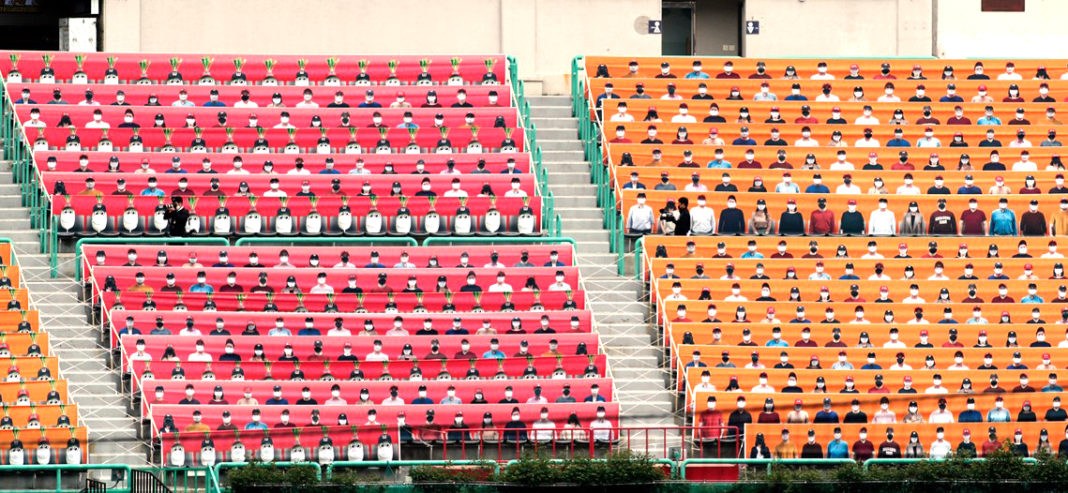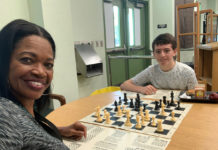Whether watching from the stands, sporting a jersey or running the field, people have an intrinsic engagement with sports. Team sports provide a sense of identity, a collective experience and, in many cases, a connection to a family legacy. When “our” team wins, we get a glimmer of refracted glory, which is often in short supply. For many, though, the main appeal of fangirling (or fanboying) is the escape it provides from the daily dramas of the real world, a simplified game of good vs. evil.
Ironically, the world currently finds itself needing escapism more than ever, but unable to obtain it.
I’m not generally engaged with my own Sporty Spice side (my favorite shirt reads, “I just hope both teams have fun”). But then, one of my dear British buddies mentioned the FA Cup Final. Like an American idiot, I asked, “What’s that?” Intrigued by his enthusiastic, almost evangelical answer, I decided to pony up $5 for an ESPN+ trial and another $35 for a low-stakes wager, an inexpensive insurance policy to keep my attention on the game. The two drinks I consumed at home brought the whole experience to about $50, roughly the price of parking at a major sporting event. This was already a win.
Wembley Stadium, the venue for this Arsenal-Chelsea matchup, holds 90,000 people. The day of the FA Cup, it held only players, coaches and essential support staff. The usual 200 journalists and 80 photographers were reduced to 25 and 12, respectively. The seats were covered in massive vinyl logos and the field was lined with screens showing images of fired-up fans. Cheering (and oddly enough, booing) sounds were piped in like a sitcom laugh track. It was a strange, post-apocalyptic viewing experience, albeit an enjoyable one.
But what was it like to be on that soccer field? As someone who’s worked extensively in another avenue of live communal engagement — theatre — I understand the importance of audience feedback. Let’s just say there’s a reason for the two-drink minimum at most comedy clubs. Apparently, the UK football clubs understood this, too. Coaches directed their players to essentially compensate for an entire stadium of fans, by cheering until their throats were dry every time they hit the sidelines. These guys had two jobs that day — play until you win, and cheer until it’s over.
Dan Abrahams, the lead psychologist for the England Rugby Union, noticed some positive effects from the new rules. “A lot of the players I’m working with are enjoying it because they don’t have the pressure of the crowd. There are some stadiums where it can be pretty toxic.”
Now, aside from not being a huge sports fan, I am also not an elite athlete. But since the lockdown commenced in March, I’ve been hitting the streets running, working up to a half marathon. Let me be clear — I hate running. I spend every mile thinking about what I’m going to eat at the end. That said, it’s been a perfectly accessible tool for quelling my restless anxiety while I’m not able to freely wander the world. To keep the pace (groan-worthy pun intended), I’ve signed up for several “virtual races.”
Just as big-league sports have had to implement changes, so too have smaller grassroots athletics. I started with the “Tutu 10k,” organized by Key West’s own Beth Moyes of Key West Theme Runs. The rules were straightforward: run any time you like within a date range, then report your time. No crowds, no pressure, no competition. Run those miles and just slink back home without unfairly comparing yourself to all the other toned bodies on the road — sign me up! I followed up with the Hemingway 5k and SUP Race, which upped the technology factor with an app called RaceJoy that tracked my time, offering robotic encouragement along the way. Family and friends could also follow along (if they were really hard up for entertainment) and send encouraging messages.
At any level of play, it’s interesting to trade human feedback for technological interjections. The inherent ingenuity serves as proof that we’ll find our way through this time without totally abandoning the things we love. As much as I enjoy the autonomy of starting a race whenever I damn well feel like it, others are longing for the camaraderie and community that comes from gathering, from moving our bodies in unison.
An 1898 study introduced the social facilitation theory — a concept that athletic performance is improved “as a result of the real or implied presence of others.”
For now, though, the loners and the social butterflies of the homegrown athletic world, and the laser-focused and showboating major leaguers, will all have to find some common ground and rely on the “implied presence of others.”
My advice? Place a bet, fix a drink, go for a run and make friends with a robot.


























